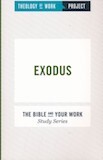Working in the Spirit: Introduction to Faith and Work by Tom Nelson (Sermon Notes)
Sermon Notes / Produced by The High Calling
Imagine a stunningly beautiful church building: a limestone exterior, stained glass, and a slate roof. For 90 years, many people simply drove by this church building paying it little if any attention, but recently this magnificent work of art was displayed in a large colored picture in the Kansas City Star, our city’s largest newspaper. The renovation had begun and the scaffolding surrounding the steeple filled the newspaper page. Above the picture was this caption, “A Job With a Higher Calling!” This caption reminds us that journalists not only have an affection for double entendre, but that many embrace a story of work where the work of the Church is seen as a higher calling than other work.
Growing up in a Christian home and sensing God’s vocational calling to be a pastor, this story of work guided my thinking as well. Deep inside I believed that my calling as a pastor was a higher calling than others who were lawyers, teachers, administrators, or business persons. Perhaps my distorted thinking was driven by spiritual pride, but it was also fueled by a theological vision that diminished the value of God’s good world and anything other than “what lasted forever.” What was “all important” was God’s Word and people’s souls. Devotion to anything else was futile and misguided.
This distorted story of work guided my life through college, in a para-church campus missionary, and Church planter. But with a little help from the Reformers, I started to see that Scripture paints a different story. Regardless of where you work, each person’s vocation is a job with a “higher calling.” Further, the Holy Spirit empowers our accomplishment of our vocational calling.
Today we’re going to focus on how the Spirit enables our work.
Genesis 1-2 shows that humans would work with God in propagating and preserving creation. Tragically, Adam and Eve’s rebellion corrupted the original design of God’s created order (Gen. 3). Both work and the workplace were and still are stained. When we work, we still feel the effects of the Fall. By the time we get to Exodus, God’s people are enslaved in Egypt, making bricks. But God miraculously rescued and sustained his people in the wilderness on their way to the Promised Land. In Exodus 19, God gives Moses his law! And during those forty days, God spends a great deal of his time instructing Moses on a building project! A tabernacle, or we might say a sanctuary! A created material space where God’s manifest presence will dwell, but also a built space for God to enter and redeem our world of work! For six chapters (Exod. 25-30), God gives Moses a detailed work order! As we now enter Exodus chapter 31, we see God’s supernatural provision to accomplish this work order!
The Lord said to Moses, See, I have called by name Bezalel the son of Uri, son of Hur, of the tribe of Judah, and I have filled him with the Spirit of God, with ability and intelligence, with knowledge and all craftsmanship, to devise artistic designs, to work in gold, silver, and bronze, in cutting stones for setting, and in carving wood, to work in every craft. And behold, I have appointed with him Oholiab, the son of Ahisamach, of the tribe of Dan. And I have given to all able men ability, that they may make all that I have commanded you… (Exodus 31:1-6)
I would like us to briefly consider three truths that emerge from this text.
Truth #1: God “called” Bezalel to a specific work. In verse 2, God tells Moses that he has called, by name, a particular person to a particular work. As an image-bearer of a working God, Bezalel was created with work in mind. Bezalel has a job to do!
My friend David Greusel is a modern day Bezalel! David is one of the leading architects in the world of sport stadiums. David’s work was featured in a recent WORLD Magazine article entitled “All-Star Architecture.” David says, “Bad church architecture is as much the result of bad theology as it is of bad design.” But David’s view of work has not always been so thoughtful. He’d tell you that at a turning point, God used this text (Exod. 31) to show He had created David, redeemed David, and called David to a specific work to do in God’s good, but broken, world!
Truth #2: God “empowered” Bezalel to do a specific work. In verse 3, God says He’s filled Bezalel with “the Spirit of God.” Each time this phrase of being filled with the Spirit is used in the Old Testament, it brings the idea of God fitting a person for a task! The New Testament uses similar language (e.g., Luke 1:15 41; Acts 2:4; Eph. 5:18), but many times we do not understand its biblical backdrop, theological development, or comprehensive outworking.
Paul implies in Ephesians 5 that being filled with the Spirit applies to the local Church, the home, and then the workplace. When Jesus sent us out into the world and sent the Helper, the Holy Spirit, one of the reasons for that was to empower us for vocational faithfulness to do the work he would call each one of us to do! The filling of the Spirit not only conforms us to Christlikeness in our relationships and in the local church, but also empowers us for a job we are to do.
We not only often have a Sunday-to-Monday gap disconnecting worship and work, we also have a walking in the Spirit, working in the Spirit gap as well! If we do not understand the Spirit-filled life as it relates to spirit-filled work, may I suggest we have an impoverished understanding of the person and work of the Holy Spirit! One of the reasons for the sizable Sunday-to-Monday gap in many of our individual lives and our churches is that we have not teased out the important implications of the filling of the Holy Spirit and our empowerment in vocational faithfulness. Miroslav Volf says, “There is a sense in which all human work is done in the power of the Spirit.” God calls us to and empowers us for a specific work!
Truth #3: God “designed” Bezalel with a specific work in mind. God highlights Bezalel’s seasoned competence. Bezalel’s skill had grown daily through disciplined work.
Holy Spirit empowered competence isn’t “genie in a bottle,” rather like a coach who assists a disciplined athlete. Jesus described the Holy Spirit as the parakletos! Our helper! Not our replacer! The filling of the Holy Spirit does not nullify or diminish human responsibility; The Holy Spirit complements it! We have been given a role in developing the skills and talents we have been given.
It didn’t take us long to observe our son Schaeffer’s verbal and creative bent and our daughter Sarah’s athletic bent. One of the unforgettable moments in our house was when Schaeffer had dutifully tried a stint at gymnastics, informed Liz in no uncertain terms that gymnastics was not for him. He looked at Liz and said, “Mom, it’s like an old shoe, it doesn’t fit me anymore!”
Like Bezalel, God has created each of us with work in mind. God has designed, called, and empowered you to specific work. So how do we connect our faith to our work? How do we bring a more robust theology of vocation to the Church? How do we close the Sunday-to-Monday gap we all struggle with? Three encouragements will suffice.
Encouragement #1: Let’s teach a more robust theology of vocation that better reflects what the Holy Scriptures reveal! A theology that understands how vocation is integral to both the image of God and the mission of God is key for teachers and preachers. Remember, for Jesus’ first 30 years on earth, he worked in a carpenter’s shop. Jesus was more than a carpenter, but he was not less.
Encouragement #2: Let’s rethink the pastoral vocation to better connect Sunday to Monday! Part of the pastor’s role is to inform the flock for God’s good design as revealed in the Bible. This means connecting Sunday to Monday. A pastor who, out of theological conviction and Gospel mission, faithfully equips his congregation for the world they inhabit a majority of their time. A pastor who designs liturgy with his people’s vocations in mind. A pastor who crafts pastoral prayers, hymnody choices, and sermon illustrations informed by a robust theology of vocation and a compelling vision of his own vocation. Let’s imagine a pastor who not only makes regular hospital calls, but regular visits to the workplace of his people. A pastor who sees that a primary work of the church is the church at work!
Encouragement #3: Let’s better grasp the Holy Spirit’s role in empowering us to do good work well done! Dorothy Sayers said, “The only Christian work, is good work well done.” If Dorothy Sayers is right, and I believe she is, then to do the good work we are all called to do requires the empowerment of the Holy Spirit in our daily lives. The Gospel changes everything: how you see your work, how you do your work, the power to do your work, and who you do your work for! Jesus said he would build his church! We must take vocation seriously, for the primary work of the church is the church at work.
Tom graduated with a Masters of Theology degree from Dallas Theological Seminary and received his doctorate from Trinity Evangelical Divinity School. He and his wife, Liz, arrived in Kansas City in 1989 to begin Christ Community Church. Tom has served as senior pastor there since that time. Tom received his ordination with the EFCA in 1992. He has served on the Midwest District Board as well as the National Ministerial Association Board. Currently he serves on the Board of Regents for Trinity International University. Tom is the author of Five Smooth Stones: Discovering the Path to Wholeness of Soul, Ekklesia: Rediscovering God’s Design for the Church, and Work Matters: Connecting Sunday Worship With Monday Work. He is also a conference speaker who calls the evangelical community to walk deeply and authentically with God. Tom and Liz reside in Leawood, Kansas. They have two adult children, Schaeffer and Sarah.










